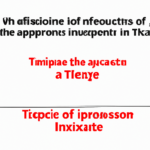Progressive taxation is a system where tax rates increase as income levels rise. This approach aims to create a fairer distribution of wealth and reduce income inequality. By taxing the wealthy at higher rates, progressive taxation generates additional revenue that can be used to fund social welfare programs. Such programs include healthcare, education, housing, and social security, which provide vital support to low-income individuals and families. Progressive taxation helps to bridge the gap between the rich and the poor, promoting a more equitable society. It can address societal needs, enhance social cohesion, and contribute to overall social welfare and well-being.
Table of Contents
- Effectiveness of progressive taxation in reducing income inequality
- Impact of progressive taxation on wealth distribution
- Perceived fairness of progressive taxation
- Potential drawbacks and criticisms of progressive taxation
- Role of progressive taxation in funding social welfare programs
(Progressive taxation and its benefits on our social services.)
Progressive taxation is a method of tax collection whereby individuals with higher incomes pay a larger proportion of their income in taxes compared to those with lower incomes. This approach is often used as a means of redistributing wealth and promoting social welfare.
The relationship between progressive taxation and social welfare is complex, with both positive and negative implications. On one hand, progressive taxation can help to reduce income inequality by ensuring that those with more financial means contribute proportionally more to society. By doing so, it can provide funding for essential public services such as healthcare, education, and social welfare programs.
Progressive taxation can also contribute to social stability by minimizing the economic disparities that can lead to social unrest. When wealth is concentrated in the hands of a few, it can result in a lack of opportunities and social exclusion for those in lower income brackets. By implementing a progressive tax system, governments can address these disparities and work towards a more equitable society.
However, it is important to consider the potential drawbacks of progressive taxation. Critics argue that it can discourage productivity and economic growth by creating disincentives for individuals to work hard or invest in their businesses. Additionally, it can lead to tax evasion and avoidance strategies as individuals seek to minimize their tax burden.
In conclusion, the relationship between progressive taxation and social welfare is multifaceted. While it can help to reduce income inequality and fund social programs, it can also have unintended consequences. Striking the right balance requires careful consideration of both the positive and negative implications, as well as regular evaluation and adjustment of tax policies. Overall, progressive taxation plays a crucial role in promoting social welfare, but it requires thoughtful implementation and ongoing monitoring to achieve the desired outcomes.
Effectiveness of progressive taxation in reducing income inequality
Income inequality is a significant issue in many societies today. One way that governments attempt to address this issue is through progressive taxation. Progressive taxation is a system where the tax rate increases as income increases. The effectiveness of progressive taxation in reducing income inequality has been a topic of debate.
Proponents argue that progressive taxation helps to redistribute wealth from the rich to the poor. By taxing higher-income individuals at a higher rate, progressive taxation aims to decrease the income gap between the rich and the poor. This can provide more resources for those who are less fortunate and in need of support.
Progressive taxation can also help fund social welfare programs that aim to reduce poverty and improve the overall well-being of society. By collecting more taxes from those who have more financial resources, governments can allocate these funds towards initiatives such as education, healthcare, and infrastructure development. These programs can help provide equal opportunities for all individuals, regardless of their economic background.
However, critics of progressive taxation argue that it can have negative effects on economic growth and productivity. They claim that higher taxes on the wealthy can discourage investment and entrepreneurship. If individuals know that a large portion of their income will be taxed, they may be less inclined to take risks and invest in businesses. This can ultimately hinder economic development and job creation.
Another criticism is that progressive taxation can lead to tax evasion and avoidance. Wealthy individuals may find ways to legally or illegally reduce their taxable income to avoid paying higher taxes. This can result in the wealthy paying a lower effective tax rate than intended, undermining the progressive nature of the taxation system.
In conclusion, while progressive taxation is intended to reduce income inequality, its effectiveness is subject to debate. It can provide more resources for social welfare programs and equal opportunities for all individuals. However, it may also have negative effects on economic growth and productivity, and can be subject to tax evasion and avoidance. Governments need to carefully consider the balance between reducing income inequality and fostering economic growth when implementing progressive taxation policies.
Impact of progressive taxation on wealth distribution
Progressive taxation plays a vital role in the distribution of wealth and its impact on society cannot be underestimated. By implementing a system where the wealthy contribute a higher percentage of their income in taxes, the government is able to address the issue of income inequality and promote social welfare.
One of the main benefits of progressive taxation is its ability to bridge the wealth gap. It ensures that those who earn more income pay a higher tax rate, which leads to a more equitable distribution of wealth. This helps to reduce poverty and improve the standard of living for the less fortunate members of society.
Moreover, progressive taxation promotes social welfare by funding essential public services. The additional revenue generated from the higher taxes paid by the wealthy can be used to invest in education, healthcare, and infrastructure. These investments create a more inclusive society, with improved access to quality education and healthcare for all citizens, regardless of their economic background.
Furthermore, progressive taxation encourages economic mobility. By taxing the wealthy at a higher rate, it reduces the concentration of wealth at the top and allows for a more fluid society. This means that individuals from lower-income backgrounds have a better chance of moving up the economic ladder, as they receive more support from government programs funded by progressive taxation.
Critics argue that progressive taxation discourages investment and hampers economic growth. However, numerous studies have shown that progressive taxation does not have a negative impact on economic performance. In fact, it can stimulate economic activity by increasing consumer spending and supporting small businesses through government programs.
Implementing progressive taxation requires careful planning and consideration. It is essential to strike a balance between collecting enough revenue to fund social welfare programs while not burdening the wealthy to the point of discouraging investment. This can be achieved through careful tax reforms and ensuring that the system is fair and transparent.
In conclusion, progressive taxation has a significant impact on wealth distribution and social welfare. It helps to address income inequality, funds essential public services, promotes economic mobility, and stimulates economic growth. By implementing a fair and effective progressive tax system, governments can create a more inclusive society where everyone has an opportunity to thrive.
Perceived fairness of progressive taxation
The perceived fairness of progressive taxation is a topic that sparks debates and discussions among economists and policymakers. Progressive taxation is a system where individuals with higher incomes pay a higher percentage of their income in taxes compared to those with lower incomes. The main idea behind this system is that it redistributes wealth and promotes social welfare.
One argument in favor of progressive taxation is that it promotes a sense of fairness and justice. Advocates argue that those who have more should contribute more to society. They believe that by taxing the wealthy at higher rates, the burden of taxation is shared more equitably, benefiting the less fortunate members of society.
Opponents of progressive taxation, on the other hand, argue that it discourages productivity and incentivizes individuals to earn less. They believe that high tax rates for the wealthy reduce their motivation to work hard and invest in the economy. They argue that a flat tax or a regressive tax system would be fairer and more efficient.
The perception of fairness in taxation is subjective and varies among individuals. Some may argue that those who have achieved higher incomes should be rewarded for their hard work and success. They might view progressive taxation as a punishment for success, stifling economic growth and discouraging entrepreneurship.
Others may consider progressive taxation as a mechanism to reduce income inequality and provide support for those in need. They believe that a more equal distribution of wealth leads to a more stable and just society, with a stronger social safety net.
Public opinion plays a significant role in shaping taxation policies. If citizens perceive progressive taxation as fair and just, they are more likely to support it. However, if they see it as punitive or inhibiting economic growth, there may be resistance to its implementation.
In conclusion, the perceived fairness of progressive taxation is a complex and multifaceted issue. While some argue that it promotes equality and social welfare, others believe it hampers economic growth. The perception of fairness depends on the individual’s values, beliefs, and understanding of economic principles. Ultimately, striking a balance between progressive taxation and social welfare is a delicate task faced by policymakers globally.
(The Progressive Income Tax: A Tale of Three Brothers)
Potential drawbacks and criticisms of progressive taxation
Progressive taxation, while often touted as a means to promote social welfare, is not without its potential drawbacks and criticisms. One common criticism of progressive taxation is that it can discourage individuals from working hard or pursuing higher-paying jobs. Critics argue that when higher earners are taxed at higher rates, they may feel disincentivized to seek promotions or increase their earnings, as it may result in a larger portion of their income being taxed. This can have unintended consequences on economic growth and productivity.
Another drawback of progressive taxation is its potential to create a dependency on government assistance. Critics argue that when the tax burden falls primarily on the wealthy, it can create a sense of entitlement among those who rely on government programs. This can lead to a decrease in individual responsibility and self-reliance, as some individuals may come to expect and rely on the government for their financial needs.
Progressive taxation is also criticized for its potential to hinder innovation and entrepreneurship. When high earners are taxed at higher rates, it may limit their ability to invest in new business ventures or take risks. This can stifle economic growth and limit job creation, as entrepreneurs and innovators may be discouraged from pursuing their ideas due to the higher tax burden they would face.
Critics also argue that progressive taxation can lead to a loss of economic competitiveness. When high earners are taxed at higher rates compared to other countries, it can incentivize them to relocate or invest elsewhere. This can result in a brain drain and the loss of valuable talent and resources from the country.
Additionally, progressive taxation can face criticism for its potential to be unfair and arbitrary. Determining the appropriate levels of taxation for different income brackets can be a complex task, and critics argue that it can be difficult to strike the right balance. Some argue that progressive taxation may punish success and discourage individuals from working hard to improve their financial situation.
While progressive taxation can be seen as a means to promote social welfare and address income inequality, it is important to consider and address the potential drawbacks and criticisms associated with this tax system. Striking the right balance between progressive taxation and economic growth and individual incentives is crucial for a well-functioning and equitable society.
Role of progressive taxation in funding social welfare programs
Progressive taxation plays a crucial role in funding social welfare programs. It is a system where the tax rate increases as income rises, ensuring that those who earn more contribute proportionally more to society. This approach is rooted in the belief that wealthier individuals have a greater ability to pay taxes and should bear a larger burden towards supporting social welfare initiatives.
One of the main benefits of progressive taxation is achieving a fair distribution of resources. By taxing higher-income individuals at higher rates, governments can generate more revenue to fund programs that aim to uplift marginalized communities and provide essential services to those in need. This helps to reduce inequality and promote social justice, enabling societies to function more harmoniously and inclusively.
Additionally, progressive taxation helps to address the concept of “ability to pay.” It recognizes that individuals with higher incomes can afford to contribute more to society without experiencing significant financial hardship. By ensuring that those who can afford to do so contribute more to the funding of social welfare programs, progressive taxation ensures a more equitable distribution of the tax burden.
Moreover, progressive taxation can help create a sense of shared responsibility. When higher-income individuals pay a larger share of their income in taxes, it fosters a sense of solidarity and partnership across different socioeconomic groups. This shared responsibility encourages a collective investment in social welfare programs, leading to a stronger social fabric and the overall well-being of society as a whole.
Critics may argue that progressive taxation discourages economic growth and investment. However, research suggests otherwise. When used in conjunction with prudent fiscal policies and effective governance, progressive taxation can help create a more stable and resilient economy. By investing in social welfare programs, governments can stimulate economic activity, improve health and education outcomes, and enhance workforce productivity.
In conclusion, progressive taxation plays a vital role in funding social welfare programs. It ensures a fair distribution of resources, addresses the concept of ability to pay, fosters a sense of shared responsibility, and contributes to overall economic growth and stability. By implementing progressive taxation systems, governments can promote social justice, reduce inequality, and create a more inclusive and prosperous society.
External Links
- Redistribution of Income and Reducing Economic Inequality – IMF …
- Tackling income inequality – the role of taxes and transfers
- Causes and Consequences of Income Inequality: A Global …
- Social Welfare and the Rate Structure: A New Look At Progressive …
- Closing the racial wealth gap requires heavy, progressive taxation of …













